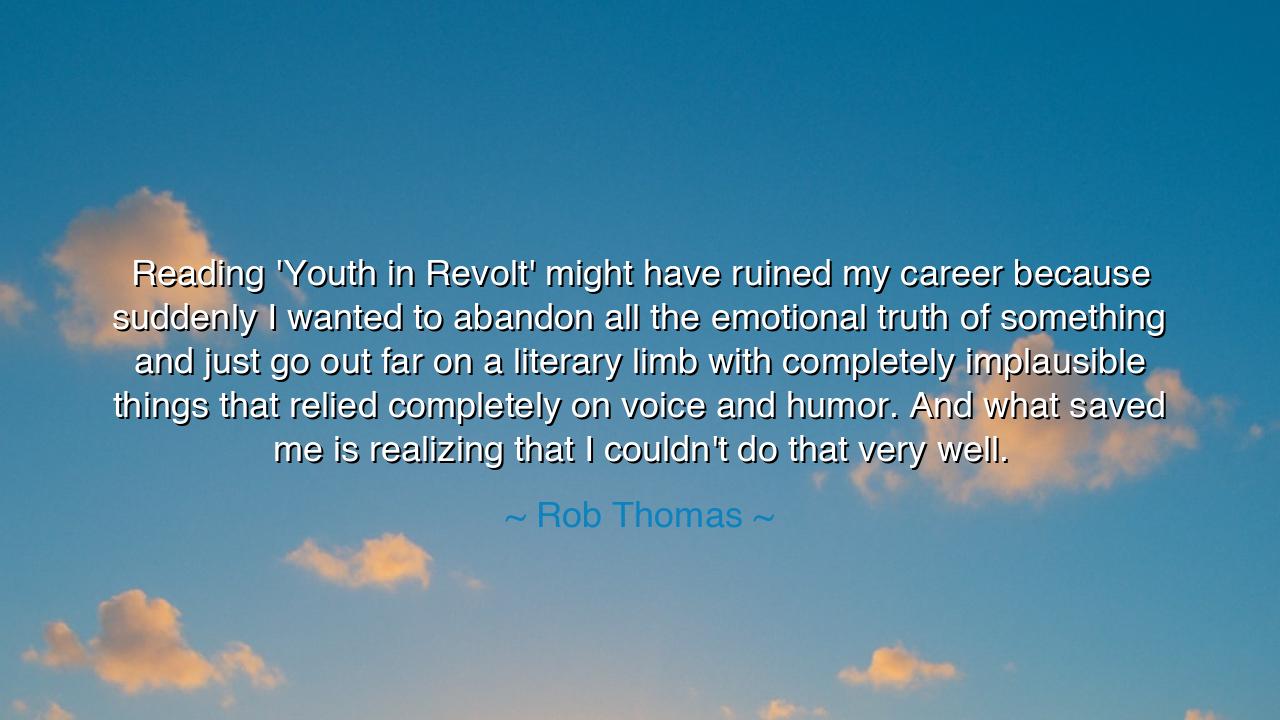
Reading 'Youth in Revolt' might have ruined my career because
Reading 'Youth in Revolt' might have ruined my career because suddenly I wanted to abandon all the emotional truth of something and just go out far on a literary limb with completely implausible things that relied completely on voice and humor. And what saved me is realizing that I couldn't do that very well.






“Reading ‘Youth in Revolt’ might have ruined my career because suddenly I wanted to abandon all the emotional truth of something and just go out far on a literary limb with completely implausible things that relied completely on voice and humor. And what saved me is realizing that I couldn’t do that very well.”
Thus spoke Rob Thomas, the writer and creator, whose words unveil one of the oldest lessons of art and life — that the pursuit of brilliance without truth leads to emptiness, and that mastery begins not in imitation, but in self-knowledge. In his reflection, Thomas confesses the seduction that every artist faces: the temptation to forsake sincerity for spectacle, substance for style. His salvation came not from triumph, but from humility — from realizing that the path of authenticity, though quieter, leads deeper into meaning.
To “abandon emotional truth” is to lose the heartbeat of creation itself. For all art — whether in word, stone, or song — begins in the pulse of the human soul. Without it, craft becomes hollow, like a beautifully carved instrument that makes no sound. Thomas, in admiring ‘Youth in Revolt’, felt the pull of artistic daring — to leap into the wild realm of wit and absurdity, where imagination knows no limits. But as he confesses, he soon found that voice and humor, though powerful, cannot alone sustain a story or a soul. They are colors upon the surface, not the foundation of the painting. Without the grounding force of truth, even the most dazzling work collapses under its own cleverness.
In the ancient world, this tension was well known. The philosopher Aristotle wrote that art must reflect life — not merely its form, but its essence. The poet who writes without truth, he said, produces only noise, no matter how intricate the rhyme. And centuries later, Michelangelo, when praised for his skill, replied that his true gift lay not in carving marble, but in revealing the living form hidden within it. So too did Thomas discover that art must reveal, not disguise, the inner life. To chase cleverness without honesty is to paint a mask over one’s own heart.
“What saved me,” he says, “is realizing that I couldn’t do that very well.” There is humility and grace in this confession. For wisdom often comes not from success, but from the recognition of one’s own limits. The ancients called this sophrosyne — the virtue of self-awareness, of knowing both one’s strengths and one’s boundaries. In this realization, Thomas found freedom — the freedom to write not as someone else, but as himself. To acknowledge that he could not outshine another’s style allowed him to rediscover his own voice, the one rooted in emotional truth, the soil from which all enduring art grows.
Consider the tale of Icarus, who, in his hunger for glory, flew too close to the sun. His wings, bound with wax, melted in the heat of his ambition, and he fell into the sea. The story endures not because it condemns flight, but because it reveals the peril of flying without understanding the limits of one’s craft. Thomas’s near ruin was an artistic Icarus moment — the temptation to soar on borrowed wings of wit and brilliance, without the grounding of truth. But unlike Icarus, he saw the danger in time and turned back toward humility, toward the steady flight of authenticity.
In this way, his words are not merely the reflection of a writer but a universal teaching. Each of us, in our own pursuits, feels the lure of imitation — to walk in the shadow of another’s success, to trade sincerity for approval, or passion for perfection. But the soul, when stripped of authenticity, loses its vitality. To be true, even imperfectly, is greater than to be false with brilliance. Thomas reminds us that wisdom begins when we cease to envy others’ gifts and begin to refine our own.
So let this lesson be carried forward:
-
Cherish emotional truth, for it is the fire that animates all creation.
-
Beware imitation, for it can disguise the loss of your own voice.
-
Honor humility, for knowing your limits is the first step toward true mastery.
-
Seek authenticity over admiration, for what is real endures when fashion fades.
Thus spoke Rob Thomas, in a confession both human and heroic. His words, born of self-awareness, echo the wisdom of the ancients: that the artist’s first duty is not to dazzle, but to reveal. And so, O seeker of creation, remember this — the truest art, like the truest life, is not about being clever, but about being real. For style may charm the mind, but only truth nourishes the heart, and only from the heart does lasting beauty flow.






AAdministratorAdministrator
Welcome, honored guests. Please leave a comment, we will respond soon